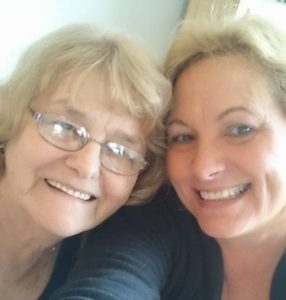Grief
An adult child that loses a parent is bound to experience grief. Grief is defined as a multifaceted response to loss, particularly to the loss of someone or something that has died, to which a bond or affection was formed. Although conventionally focused on the emotional response to loss, it also has physical, cognitive, behavioral, social, cultural, spiritual and philosophical dimensions. https://en.wikipedia.org/wiki/Grief
Grief is complex. Grief is raw. No two people will experience grief the same. Grief has no duration. There is no end date for grief. I am in the midst of this now. My mom, my rock, passed on January 6th after a 16-week fight for her life. It is not even a week yet and I know and recognize I have a long road of healing ahead of me. I am forever changed.

Grief is different for everyone based on the relationship between the two people. It’s different for everyone based on their own personal level of emotional intelligence. I know one way to heal is to feel gratitude. This is challenging. I am grateful for the wonderful, loving relationship I had with my mom. Not everyone can say this. However, that doesn’t take away the pain. It is a process I must go through.
Grieving Adults
The loss of a parent can be devastating to a young child. The same is true for children who have reached an adult age. Losing a parent as an adult child is sure to cause grief. Just because someone is a responsible, successful adult does not mean that the death of a parent is automatically easier to endure. The exact opposite is often the case.
In many ways, this situation can be much harder for the adult child, since their perception and understanding of what is going on is crystal clear.

You may be an adult, but that doesn’t mean you aren’t your parents’ child in your eyes. Adults in their 40’s and 50’s and older can experience significant emotional problems dealing with the death of a parent, partly because they have developed a decades-long bond which has just been irrevocably severed.
Even if the parent/adult child relationship was not the greatest, each person only has one set of parents. You may have lived your entire adult life with little interaction with one of the people, or both persons, who helped create you. This does not mean that you won’t experience inconsolable feelings of loss, frustration, abandonment and anxiety over your parent’s death. The irreplaceable nature of your parents, regardless the relationship you have with them, means losing one or both of them forever can be extremely traumatic.
Considerations a Grieving Younger Child Doesn’t Have to Deal With
Adult children may be asked to deal with funeral arrangements and other considerations. This adds an “in-your-face” aspect of losing a parent that doesn’t allow you to ignore the situation. Your entire family structure is changed, and possibly not in a good way. As an adult, children may unfortunately have to deal with uncaring siblings whose only concern is getting the biggest piece of the inheritance pie.
Housing issues, the payment of bills, the displacement of relatives, and the impending thoughts of dozens of responsibilities and newly created circumstances can mean that the grief is not immediately and properly dealt with. Once the funeral is over, the event has passed, and things have calmed down, the adult child absolutely must go through a natural healing process.
This means facing the situation head on and accepting what has happened.
The responsibilities of an adult child mourning the loss of a parent can get in the way of an emotional response. At first, it may seem that this child, who is an adult, is not grieving “properly”. In this case, be there for that person, because an emotional release is bound to occur, when all the duties and tasks related to burying their parent have been taken care of.

6 Ways to Help Someone in Mourning
It is tough to see anyone you love in pain. You can almost feel their sorrow when they are grieving the loss of someone close to them. It is sometimes difficult for a person with that mindset to get past their painful feelings. The next time someone you care about is having a hard time getting through their mourning and moving on with life, use the following 6 proven methods to help them heal.
1 – Be There to Listen
Sometimes, just listening is enough to help someone move on. Be a good listener. Listen without judgment. The healing does not come in what you have to say in response to a morning person’s comments, but rather from that person simply talking about his or her feelings.
2 – Check in Frequently
Grief can be devastating. In extreme situations it can lead to self-destructive behavior, and thoughts of suicide. Make sure you are checking in frequently when a loved one is going through a period of mourning. Just knowing that you are there can be a great source of comfort.
3 – Try Not to Give Their Grief Some Explanation
Never attempt to explain away someone’s feelings. People experience emotions differently. Trying to label or explain someone’s mourning process may come from a place of your best intentions. However, it may not be received in that way.
4 – Accept Mood Swings
Anger is many times a part of the grieving process. The person you care about is in mourning, and that person’s emotions are in a turmoil. You should expect wild mood swings, irritability, frustration, and sometimes lashing out at you, even though you were no part of the problem. Accept this normal part of the healing process, and don’t be reactionary to any emotional outbursts.
5 – Help out with Daily Tasks and Responsibilities
Even the simplest of chores and responsibilities can seem monumental to someone in mourning. Many times, a grieving person simply doesn’t care about performing the normal, day-to-day activities which are a part of all our lives. You can help in this regard and take on some of those commitments yourself.
6 – Try Not to Give Advice
As mentioned earlier, simply listening to someone talk about their grief is a great way to help them through the morning process. However, this does not mean giving advice. Even though your every thought is to give helpful advice, you are not a licensed or certified grief counselor.

Everyone grieves differently. The 6 strategies listed will help you assist someone going through a difficult morning process. This point is just as important. Don’t be judgmental, which means accepting someone’s response to grief, even if it is not the way that you may handle the same type of situation. Grief is something we will all experience. How we experience and react to it will be unique to the individual.
